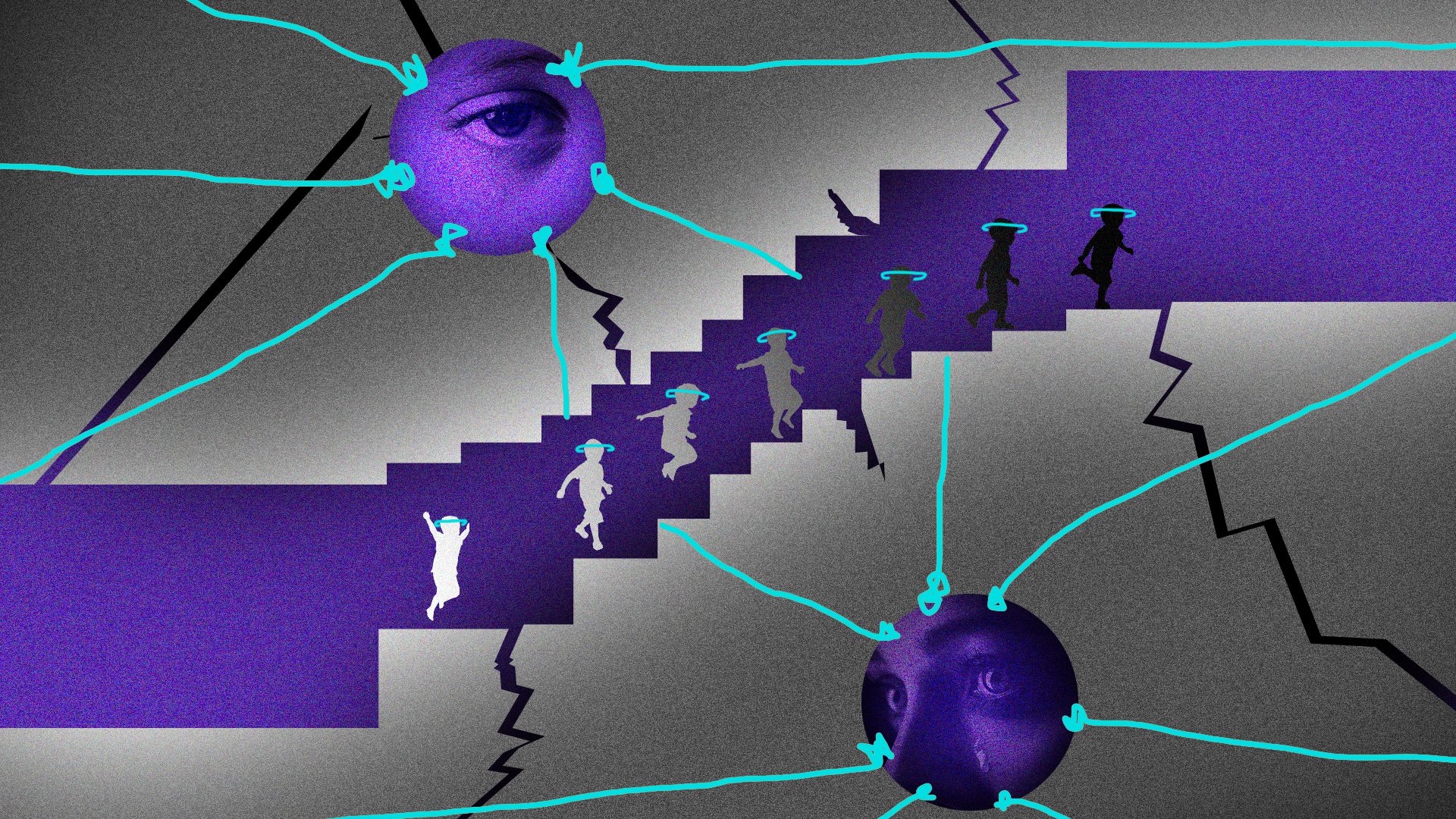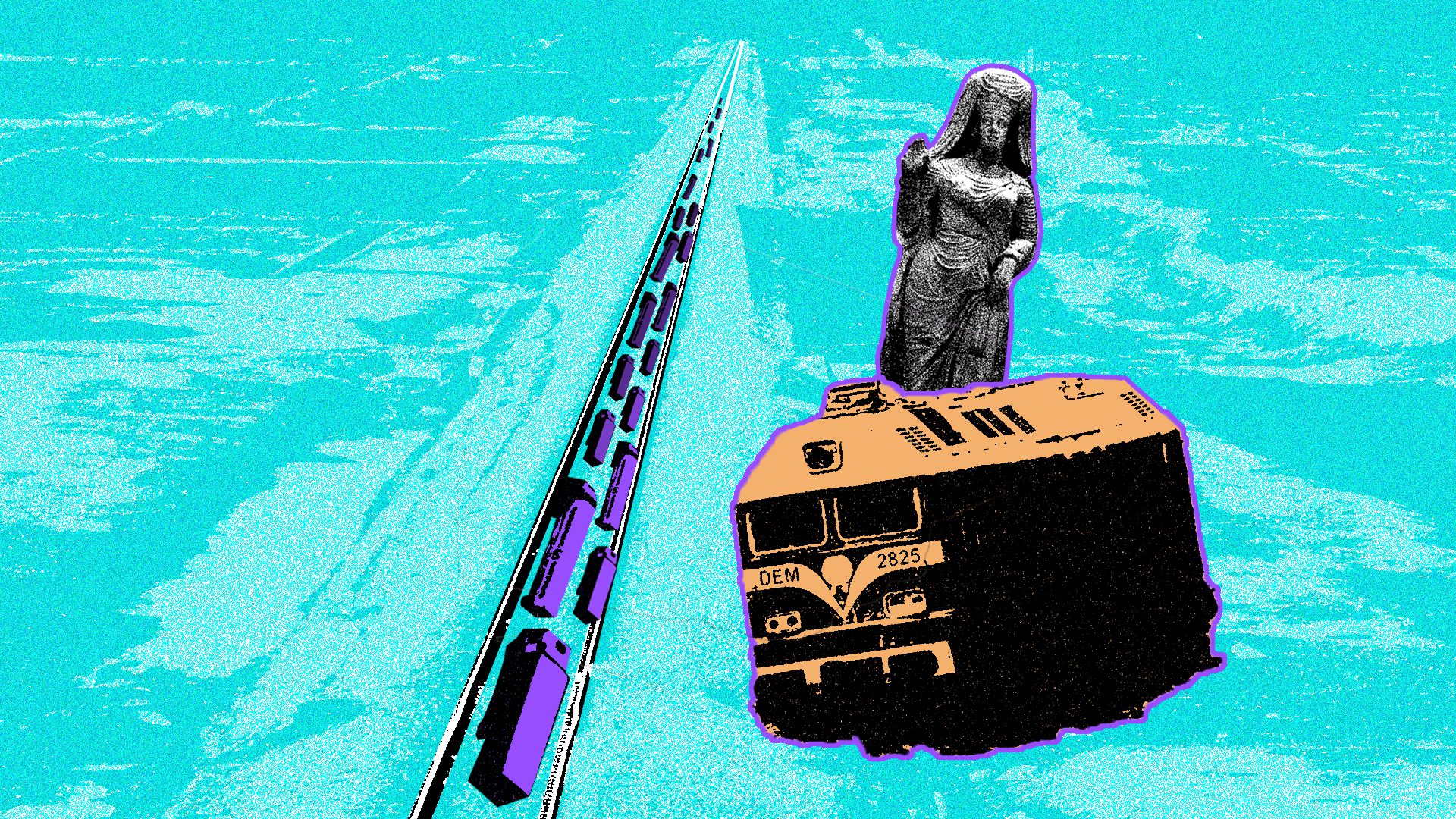سيارات "الحمل" تقسو على الطرق السريعة
Heavy Load Trucks Damage Highways While Railways Await A Revival
19 Apr 2023
Death stalks road users with potholes and ruts as its deadly weapons. Every day, a few lives are taken of travellers who must undergo this danger, even for the simplest duty. This is due to the decline of railways and trains transporting freight and passengers, but can this problem be resolved through cooperation? The story […]
Death stalks road users with potholes and ruts as its deadly weapons. Every day, a few lives are taken of travellers who must undergo this danger, even for the simplest duty. This is due to the decline of railways and trains transporting freight and passengers, but can this problem be resolved through cooperation? The story of cars, trucks, trains, and many victims.
On several roads linking Iraqi cities, death stalks road users with potholes and ruts as its deadly weapons. Every day, a few lives are taken of travellers who must undergo this danger, even for the simplest duty, such as moving from one city to another.
The name “Death Road” was given to many highways that witness horrific traffic accidents daily. Abu Yasser has to navigate potholes and ruts with his car when heading from Baghdad to Duhok in the far north of Iraq for his own and passengers’ safety. However, this adds two extra hours to the trip’s duration, extending it from five hours to seven.
Traffic accidents claimed the lives of 2,152 Iraqis in 2020 and left 8,383 injured. Recorded traffic accidents that year reached 6,170. Accidents became more deadly in 2021, with 10,659 recorded traffic accidents, of which 2,709 were fatal. According to the Central Statistical Bureau, 2021 traffic accidents left 2,828 passengers dead and 11,230 injured.
These accidents often appear on social media websites due to their frightful nature. Over a month ago, more than eleven teachers were killed on the Baghdad-Babil Road after their vehicle hit another speeding car coming in the opposite direction. Another accident that killed five people caught Iraqis’ attention during the same period in Anbar Governorate, accentuating demands to repair roads connecting governorates after some have become practically impassable for vehicles due to being too narrow or partly cracked and in urgent need of repair. As roads are damaged, not maintained and sadly not subjected to traffic regulations, the sight of destroyed cars by their sides has become a familiar sight in Iraq. Among the main causes of potholes and ruts are the summer’s intense heat and trucks carrying more than their legally specified weight, parking on the asphalt for too long.
“The allowed weight for heavy trucks is specified at thirty-two tons plus the weight of the vehicle, but no one complies with it”, said Ammar Walid, a retired general in the traffic police.
The Roads and Bridges Law approved in 2013 does not stipulate the permitted sizes or weights of payloads, as it referred this to the specialised authorities to be announced separately. Based on this, the Ministry of Construction and Housing announced the permitted weight in Statement No. 2 for 2013. The statement divided axle weights of wheels allowed on paved roads into four categories; seven tons for single and double axles with steerable wheels, thirteen tons for single axles with non-steerable wheels, twenty tons for double axles with non-steerable wheels, and twenty-seven tons for triple axles with non-steerable wheels, Walid said that trucks are essential in freight transportation, but operating railways for transportation would lighten a large part of the load on the roads. He added that operating railways would serve the common good in two ways: easing traffic jams as the number of cars entering Baghdad would decrease, and reducing the damage caused by trucks carrying heavy weights, especially when they stop at checkpoints.
Going back in time
After Germany obtained a concession from the Ottoman government to establish a railway (Konya-Adana-Aleppo-Mosul-Baghdad) in 1902, the cornerstone was laid for the first railway in Iraq in 1912 connecting Baghdad and Samarra and was 121 kilometres in length. Two years later, the first trip was made on the line. Then, the railway administration was formed in Iraq under the British army’s control. It was soon transferred to a civilian administration in 1920 which became an Iraqi civilian administration in 1936.
As soon as the First World War ended, a connecting line between Samarra and Baiji was constructed and then extended to Al-Shirqat and Mosul. In 1940, the railway line was extended to reach the Syrian borders. It was then linked to the Syrian and Turkish lines and then to the European network. During the same period, the Baghdad-Basra line was constructed by Britain to serve its military purposes, as well as the Baghdad-Falluja railway reaching the Duban Canal near Lake Habbaniyah.
Following this, the (Baghdad-Hillah-Kifl) line and the (Baghdad-Baquba-Kirkuk) line were constructed. The Sarafiya Bridge was also built in Baghdad, a joint iron bridge for cars and trains, in addition to the building of the Central International Station in 1952.
In the seventies and eighties, the Iraqi government undertook development plans that contained railway projects, including the (Baghdad-Husaybah-Akashat) line that connects phosphate mines with the main factories, and fertiliser plants in Akashat with the ports of Basra. The (Kirkuk-Baiji-Haditha) line, part of the (Musayib-Karbala-Najaf-Samawah) arc line, the (Mosul-Zakho) line, and the (Baghdad-Qa’im-Husaybah) line were also constructed with the operating speed of 160 kilometres per hour for passenger trains and 100 kilometres per hour for freight trains. Several projects were also launched, such as linking the Safwan and Al-Amarah districts with the (Baghdad-Basra) railway, the Iraq-Kuwait and Iraq-Jordan railway projects, and connecting Iraq with Syria over the Euphrates River.
Iraqi railways increased in length by 849 kilometres, from 1192 kilometres in 1968 to 2041 kilometres in 1977. These lines were essential in connecting Iraqi regions, connecting Iraq with Syria and Turkey, and facilitating goods transportation. However, Iraqi railways later suffered from a lack of financial revenues from transporting passengers and goods due to security instability and the sabotaged and worn-out lines, carriages, and vehicles, which made railways a burden on the national economy instead of revitalising it.
It is enough to note the reduced number of passengers, in 2002, to see the decline in the importance of railways in Iraq, as it did not exceed 1248 passengers, according to the Central Statistical Bureau. This number decreased further to 345 passengers in 2003.
Crisis and loss
Before 2003, the General Railway Company used to transport all goods with its specialised trucks to all state departments and was a profitable company financing the state treasury from its profits. However, the company was massively affected by successive wars and the economic blockade that affected most of the infrastructure and weakened the efficiency of trains, vehicles, carriages, and lines. This resulted from the inability to import reserve materials and caused mobile units, which are essential in providing public services to citizens, to wear out.
After 2003, railways became a failing industry because of the reluctance of most state departments to use trains for transportation due to the unstable security situation, lack of insurance for transported goods, and lack of safety and speed, which led to most freight transportation lines being suspended.
Among the suspended lines are: the line transporting iron and steel factory products in Khor Al-Zubair; the one transporting fertilisers in Abi Al-Khasib; the one transporting cement from Umm Qasr Cement Factory, along with lines transporting grain and crude oil.
After this deterioration, the rise of Islamic State “ISIS” in 2014 eliminated what was left, causing the suspension of most lines in the western region. Today, the (Baghdad-Basra) line is the main line for passengers and freight transportation, and the General Railway Company is a “failed” company, according to a study by the Financial Control Bureau in 2016. The study revealed the low level of railway transportation and the reluctance of citizens to use it identifying the key reasons behind the network’s poor coverage in many areas of Iraq. The study stated that this has led to heavy traffic and road damage due to heavy-load trucks damaging road surfaces.
According to the study, the ministry contracted a number of companies to carry out projects for constructing new railway lines. Most of these projects were not implemented despite the signing of contracts in 2004. The study summarised the reasons behind this failure as contracting non-specialised companies and poor planning.
The study also pointed out the apparent failure in planning railway development and referred to two causes: connecting Iraqi railways with neighbouring countries and extending lines within Iraq. This distracted efforts and financial allocations that were supposed to prioritise completing the internal network first.
Confronting the tribes
Iraqi authorities were aware of the road damage resulting from heavy loads, so they approved an amendment to the Public Roads Bill in early 2012, imposing hefty fines on those who violated permitted weights, according to Articles 8,10, and 14.
Article 14 of the law specified impounding the vehicle of whoever violates axle weight as a penalty until the excess load is unloaded at the violator’s expense. It also imposed a fine of five thousand dinars for every one kilogram of overload and a demurrage of twenty thousand dinars for every night for which the impounded vehicle remained in custody. Those who evade weighing the vehicle will be fined a minimum of 500 thousand dinars and a maximum of one million dinars per load, whether the violator is the driver or the owner of the vehicle.
At the same time, Article 8 gave the State Board for Roads and Bridges the right to collect fees for passing vehicles with revenues allocated for road maintenance and development. According to the Ministry’s instructions an alternative road should be provided for citizens free of charge. Article 10 required the Ministry to prepare roads with specific standards and roads connecting governorates. It also allowed it to collect weight fees from each vehicle of no less than twenty thousand dinars per load each time. According to the Ministry’s instructions, weighing stations could be operated by the private sector, and the revenues would be allocated for the maintenance of public roads of a governorate.
“The implementation of Article 10 was poor despite its importance”, Waild told Jummar, adding that implementing this law clashed with tribal traditions, as confrontations led to the the destruction of weighing stations.
Roads were not only destroyed by overloads. Consultant Road Engineer, Ali Al-Kinani, told Jummar that there are other technical issues involved. Problems start with the bitumen quality, the binder, previously evaluated by the Organisation of Standardisation and Quality Control, and the base material for the consolidation of cement concrete. The bitumen currently used is substandard, with a significant defect in the asphalt mixtures, which is one of the reasons for potholes and ruts appearing in the asphalt of Iraqi roads.
This defect causes the asphalt to break down and transform into loose pebbles if the cement is placed at a lower temperature than the standard specifications Additionally, the compaction process must be done in three stages; the first starts at a temperature of 165 and ends at 135 degrees Celsius, the second ends at 100 degrees, and the third ends at 70 degrees. “When the temperature reaches the third stage, asphalt can no longer be compacted, as it would lead to the concrete breaking due to it being inactive and thus cannot be used”, Al-Kinani added.
He explained that all these stages must be precise and that the thickness range between each layer should not exceed a few millimetres. These layers have standards and examinations to determine their efficiency in load-bearing. If the first layer of the road or the base – called “space” in Iraqi dialect – contains considerable divergence, then ruts will form under the pressure of vehicles’ heavy loads. According to Al-Kinani, one square metre of asphalt can bear ten tons. If this weight is put on asphalt with uneven layers, however, ruts will appear, especially on highways used by heavy trucks carrying overloaded freight.
Will it get better?
The General Railway Company seems optimistic about the future of railway lines despite the current deteriorating situation. Younis Khaled Jawad, the general manager of the company, told Jummar that many projects would be completed within this year’s plan, including the (Baghdad-Yusufiya-Hillah-Samawah) line and the (Samawah-Ghbeishih-Berqa) line, which he described as “big and important projects”.
He pointed out that the company will launch large projects during 2023, the most important of which is a line connecting the Faw Port with the Iraqi-Turkish border at a length of 1,200 kilometres, the hanging train project that will serve people in Baghdad and ease traffic jams, the (Samawah-Hakama) line project, and a large bridge project on the Euphrates River. The company also has proposals for projects such as the ring line project around Baghdad that will move the railway line into circular routes outside the capital, which aims to end main street intersections in Baghdad, in cooperation with the Baghdad Municipality and the Ministry of Construction and Housing
The estimated cost of these projects cannot be determined because each project has its own feasibility study and will be implemented over several years. “Some projects will be funded by loans, some by investment, and others by the governorates that wish to have railway lines”, Jawad said. The general manager disagrees with the Audit Bureau’s report regarding the deteriorating conditions of railways and argues that the coverage of trips from different governorates to Basra during the Arabian Gulf Cup [Khaleeji 25] with seven trains running per day is an example of the efficiency and quality of the service. However, he admits that lines are old and subjected to many faults, which forces train drivers to drive slowly for the safety of passengers, making the time of trips to Basra, for example, much longer.
Awaiting cooperation
According to Jawad, railways currently transport three million litres of the fuel material “black oil” daily. This process is carried out for the Oil Marketing Company in Iraq, “SOMO”, as the oil is transported from the Baiji refineries and Al-Dora refinery in Baghdad to the port of Umm Qasr in Basra for export outside Iraq. Jawad expects these rates to rise shortly as the Ministry of Oil begins to expand in this field. “Railways can reach seven million litres a day; we can reach this rate soon”, explained the general manager.
In May 2021, a train carrying black oil derailed in the Al-Nebai area around the northern outskirts of Baghdad. It raised suspicions at the time that it was deliberately sabotaged as some people were affected by depriving tank companies, which make enormous profits, of certain concessions. However, Jawad denied this assumption, saying that it was due to technical reasons related to the railway line being old in that area, dating back to the sixties and seventies of the previous century. He pointed out that the renewal of this line was suspended when “ISIS” occupied the area in 2014, but it is now moving forward.
The Council of Ministers issued a decision in 2015 approving the General Railway Company as a national carrier, but line damages, especially after the “ISIS” occupation, prevented its implementation. In 2022, the decision resulted in a contract with the Ministry of Oil to transport oil derivatives from the Baiji refinery, and with SOMO to transport crude oil to the Basra port for exportation.
The railway company’s public relations department says that transportation by railway would provide a pollution-free environment for cities, reduce horrific traffic accidents that claim many lives, and reduce road and bridge damages caused by unsupervised trucks carrying over heavy loads. However, the company is waiting for more involvement from different ministries, that previously used railways for transportation, to revive the business and make higher profits.
Read More

“She Brought a Fatwa from Khamenei and Al-Azhar, But It Went Nowhere”: The Struggles of Trans People in the Iraqi Health Sector

“Everyone has a Right to the Kids Except their Mother”: On Women Fighting for the Custody of Their Children

Iraqi Prisoners Blackmailed to Pay To Obtain Release Papers After Completing Their Sentence

“We Have to Make a Living Somehow”: Women Working Hard under the Heat of Dhi Qar
Death stalks road users with potholes and ruts as its deadly weapons. Every day, a few lives are taken of travellers who must undergo this danger, even for the simplest duty. This is due to the decline of railways and trains transporting freight and passengers, but can this problem be resolved through cooperation? The story of cars, trucks, trains, and many victims.
On several roads linking Iraqi cities, death stalks road users with potholes and ruts as its deadly weapons. Every day, a few lives are taken of travellers who must undergo this danger, even for the simplest duty, such as moving from one city to another.
The name “Death Road” was given to many highways that witness horrific traffic accidents daily. Abu Yasser has to navigate potholes and ruts with his car when heading from Baghdad to Duhok in the far north of Iraq for his own and passengers’ safety. However, this adds two extra hours to the trip’s duration, extending it from five hours to seven.
Traffic accidents claimed the lives of 2,152 Iraqis in 2020 and left 8,383 injured. Recorded traffic accidents that year reached 6,170. Accidents became more deadly in 2021, with 10,659 recorded traffic accidents, of which 2,709 were fatal. According to the Central Statistical Bureau, 2021 traffic accidents left 2,828 passengers dead and 11,230 injured.
These accidents often appear on social media websites due to their frightful nature. Over a month ago, more than eleven teachers were killed on the Baghdad-Babil Road after their vehicle hit another speeding car coming in the opposite direction. Another accident that killed five people caught Iraqis’ attention during the same period in Anbar Governorate, accentuating demands to repair roads connecting governorates after some have become practically impassable for vehicles due to being too narrow or partly cracked and in urgent need of repair. As roads are damaged, not maintained and sadly not subjected to traffic regulations, the sight of destroyed cars by their sides has become a familiar sight in Iraq. Among the main causes of potholes and ruts are the summer’s intense heat and trucks carrying more than their legally specified weight, parking on the asphalt for too long.
“The allowed weight for heavy trucks is specified at thirty-two tons plus the weight of the vehicle, but no one complies with it”, said Ammar Walid, a retired general in the traffic police.
The Roads and Bridges Law approved in 2013 does not stipulate the permitted sizes or weights of payloads, as it referred this to the specialised authorities to be announced separately. Based on this, the Ministry of Construction and Housing announced the permitted weight in Statement No. 2 for 2013. The statement divided axle weights of wheels allowed on paved roads into four categories; seven tons for single and double axles with steerable wheels, thirteen tons for single axles with non-steerable wheels, twenty tons for double axles with non-steerable wheels, and twenty-seven tons for triple axles with non-steerable wheels, Walid said that trucks are essential in freight transportation, but operating railways for transportation would lighten a large part of the load on the roads. He added that operating railways would serve the common good in two ways: easing traffic jams as the number of cars entering Baghdad would decrease, and reducing the damage caused by trucks carrying heavy weights, especially when they stop at checkpoints.
Going back in time
After Germany obtained a concession from the Ottoman government to establish a railway (Konya-Adana-Aleppo-Mosul-Baghdad) in 1902, the cornerstone was laid for the first railway in Iraq in 1912 connecting Baghdad and Samarra and was 121 kilometres in length. Two years later, the first trip was made on the line. Then, the railway administration was formed in Iraq under the British army’s control. It was soon transferred to a civilian administration in 1920 which became an Iraqi civilian administration in 1936.
As soon as the First World War ended, a connecting line between Samarra and Baiji was constructed and then extended to Al-Shirqat and Mosul. In 1940, the railway line was extended to reach the Syrian borders. It was then linked to the Syrian and Turkish lines and then to the European network. During the same period, the Baghdad-Basra line was constructed by Britain to serve its military purposes, as well as the Baghdad-Falluja railway reaching the Duban Canal near Lake Habbaniyah.
Following this, the (Baghdad-Hillah-Kifl) line and the (Baghdad-Baquba-Kirkuk) line were constructed. The Sarafiya Bridge was also built in Baghdad, a joint iron bridge for cars and trains, in addition to the building of the Central International Station in 1952.
In the seventies and eighties, the Iraqi government undertook development plans that contained railway projects, including the (Baghdad-Husaybah-Akashat) line that connects phosphate mines with the main factories, and fertiliser plants in Akashat with the ports of Basra. The (Kirkuk-Baiji-Haditha) line, part of the (Musayib-Karbala-Najaf-Samawah) arc line, the (Mosul-Zakho) line, and the (Baghdad-Qa’im-Husaybah) line were also constructed with the operating speed of 160 kilometres per hour for passenger trains and 100 kilometres per hour for freight trains. Several projects were also launched, such as linking the Safwan and Al-Amarah districts with the (Baghdad-Basra) railway, the Iraq-Kuwait and Iraq-Jordan railway projects, and connecting Iraq with Syria over the Euphrates River.
Iraqi railways increased in length by 849 kilometres, from 1192 kilometres in 1968 to 2041 kilometres in 1977. These lines were essential in connecting Iraqi regions, connecting Iraq with Syria and Turkey, and facilitating goods transportation. However, Iraqi railways later suffered from a lack of financial revenues from transporting passengers and goods due to security instability and the sabotaged and worn-out lines, carriages, and vehicles, which made railways a burden on the national economy instead of revitalising it.
It is enough to note the reduced number of passengers, in 2002, to see the decline in the importance of railways in Iraq, as it did not exceed 1248 passengers, according to the Central Statistical Bureau. This number decreased further to 345 passengers in 2003.
Crisis and loss
Before 2003, the General Railway Company used to transport all goods with its specialised trucks to all state departments and was a profitable company financing the state treasury from its profits. However, the company was massively affected by successive wars and the economic blockade that affected most of the infrastructure and weakened the efficiency of trains, vehicles, carriages, and lines. This resulted from the inability to import reserve materials and caused mobile units, which are essential in providing public services to citizens, to wear out.
After 2003, railways became a failing industry because of the reluctance of most state departments to use trains for transportation due to the unstable security situation, lack of insurance for transported goods, and lack of safety and speed, which led to most freight transportation lines being suspended.
Among the suspended lines are: the line transporting iron and steel factory products in Khor Al-Zubair; the one transporting fertilisers in Abi Al-Khasib; the one transporting cement from Umm Qasr Cement Factory, along with lines transporting grain and crude oil.
After this deterioration, the rise of Islamic State “ISIS” in 2014 eliminated what was left, causing the suspension of most lines in the western region. Today, the (Baghdad-Basra) line is the main line for passengers and freight transportation, and the General Railway Company is a “failed” company, according to a study by the Financial Control Bureau in 2016. The study revealed the low level of railway transportation and the reluctance of citizens to use it identifying the key reasons behind the network’s poor coverage in many areas of Iraq. The study stated that this has led to heavy traffic and road damage due to heavy-load trucks damaging road surfaces.
According to the study, the ministry contracted a number of companies to carry out projects for constructing new railway lines. Most of these projects were not implemented despite the signing of contracts in 2004. The study summarised the reasons behind this failure as contracting non-specialised companies and poor planning.
The study also pointed out the apparent failure in planning railway development and referred to two causes: connecting Iraqi railways with neighbouring countries and extending lines within Iraq. This distracted efforts and financial allocations that were supposed to prioritise completing the internal network first.
Confronting the tribes
Iraqi authorities were aware of the road damage resulting from heavy loads, so they approved an amendment to the Public Roads Bill in early 2012, imposing hefty fines on those who violated permitted weights, according to Articles 8,10, and 14.
Article 14 of the law specified impounding the vehicle of whoever violates axle weight as a penalty until the excess load is unloaded at the violator’s expense. It also imposed a fine of five thousand dinars for every one kilogram of overload and a demurrage of twenty thousand dinars for every night for which the impounded vehicle remained in custody. Those who evade weighing the vehicle will be fined a minimum of 500 thousand dinars and a maximum of one million dinars per load, whether the violator is the driver or the owner of the vehicle.
At the same time, Article 8 gave the State Board for Roads and Bridges the right to collect fees for passing vehicles with revenues allocated for road maintenance and development. According to the Ministry’s instructions an alternative road should be provided for citizens free of charge. Article 10 required the Ministry to prepare roads with specific standards and roads connecting governorates. It also allowed it to collect weight fees from each vehicle of no less than twenty thousand dinars per load each time. According to the Ministry’s instructions, weighing stations could be operated by the private sector, and the revenues would be allocated for the maintenance of public roads of a governorate.
“The implementation of Article 10 was poor despite its importance”, Waild told Jummar, adding that implementing this law clashed with tribal traditions, as confrontations led to the the destruction of weighing stations.
Roads were not only destroyed by overloads. Consultant Road Engineer, Ali Al-Kinani, told Jummar that there are other technical issues involved. Problems start with the bitumen quality, the binder, previously evaluated by the Organisation of Standardisation and Quality Control, and the base material for the consolidation of cement concrete. The bitumen currently used is substandard, with a significant defect in the asphalt mixtures, which is one of the reasons for potholes and ruts appearing in the asphalt of Iraqi roads.
This defect causes the asphalt to break down and transform into loose pebbles if the cement is placed at a lower temperature than the standard specifications Additionally, the compaction process must be done in three stages; the first starts at a temperature of 165 and ends at 135 degrees Celsius, the second ends at 100 degrees, and the third ends at 70 degrees. “When the temperature reaches the third stage, asphalt can no longer be compacted, as it would lead to the concrete breaking due to it being inactive and thus cannot be used”, Al-Kinani added.
He explained that all these stages must be precise and that the thickness range between each layer should not exceed a few millimetres. These layers have standards and examinations to determine their efficiency in load-bearing. If the first layer of the road or the base – called “space” in Iraqi dialect – contains considerable divergence, then ruts will form under the pressure of vehicles’ heavy loads. According to Al-Kinani, one square metre of asphalt can bear ten tons. If this weight is put on asphalt with uneven layers, however, ruts will appear, especially on highways used by heavy trucks carrying overloaded freight.
Will it get better?
The General Railway Company seems optimistic about the future of railway lines despite the current deteriorating situation. Younis Khaled Jawad, the general manager of the company, told Jummar that many projects would be completed within this year’s plan, including the (Baghdad-Yusufiya-Hillah-Samawah) line and the (Samawah-Ghbeishih-Berqa) line, which he described as “big and important projects”.
He pointed out that the company will launch large projects during 2023, the most important of which is a line connecting the Faw Port with the Iraqi-Turkish border at a length of 1,200 kilometres, the hanging train project that will serve people in Baghdad and ease traffic jams, the (Samawah-Hakama) line project, and a large bridge project on the Euphrates River. The company also has proposals for projects such as the ring line project around Baghdad that will move the railway line into circular routes outside the capital, which aims to end main street intersections in Baghdad, in cooperation with the Baghdad Municipality and the Ministry of Construction and Housing
The estimated cost of these projects cannot be determined because each project has its own feasibility study and will be implemented over several years. “Some projects will be funded by loans, some by investment, and others by the governorates that wish to have railway lines”, Jawad said. The general manager disagrees with the Audit Bureau’s report regarding the deteriorating conditions of railways and argues that the coverage of trips from different governorates to Basra during the Arabian Gulf Cup [Khaleeji 25] with seven trains running per day is an example of the efficiency and quality of the service. However, he admits that lines are old and subjected to many faults, which forces train drivers to drive slowly for the safety of passengers, making the time of trips to Basra, for example, much longer.
Awaiting cooperation
According to Jawad, railways currently transport three million litres of the fuel material “black oil” daily. This process is carried out for the Oil Marketing Company in Iraq, “SOMO”, as the oil is transported from the Baiji refineries and Al-Dora refinery in Baghdad to the port of Umm Qasr in Basra for export outside Iraq. Jawad expects these rates to rise shortly as the Ministry of Oil begins to expand in this field. “Railways can reach seven million litres a day; we can reach this rate soon”, explained the general manager.
In May 2021, a train carrying black oil derailed in the Al-Nebai area around the northern outskirts of Baghdad. It raised suspicions at the time that it was deliberately sabotaged as some people were affected by depriving tank companies, which make enormous profits, of certain concessions. However, Jawad denied this assumption, saying that it was due to technical reasons related to the railway line being old in that area, dating back to the sixties and seventies of the previous century. He pointed out that the renewal of this line was suspended when “ISIS” occupied the area in 2014, but it is now moving forward.
The Council of Ministers issued a decision in 2015 approving the General Railway Company as a national carrier, but line damages, especially after the “ISIS” occupation, prevented its implementation. In 2022, the decision resulted in a contract with the Ministry of Oil to transport oil derivatives from the Baiji refinery, and with SOMO to transport crude oil to the Basra port for exportation.
The railway company’s public relations department says that transportation by railway would provide a pollution-free environment for cities, reduce horrific traffic accidents that claim many lives, and reduce road and bridge damages caused by unsupervised trucks carrying over heavy loads. However, the company is waiting for more involvement from different ministries, that previously used railways for transportation, to revive the business and make higher profits.





